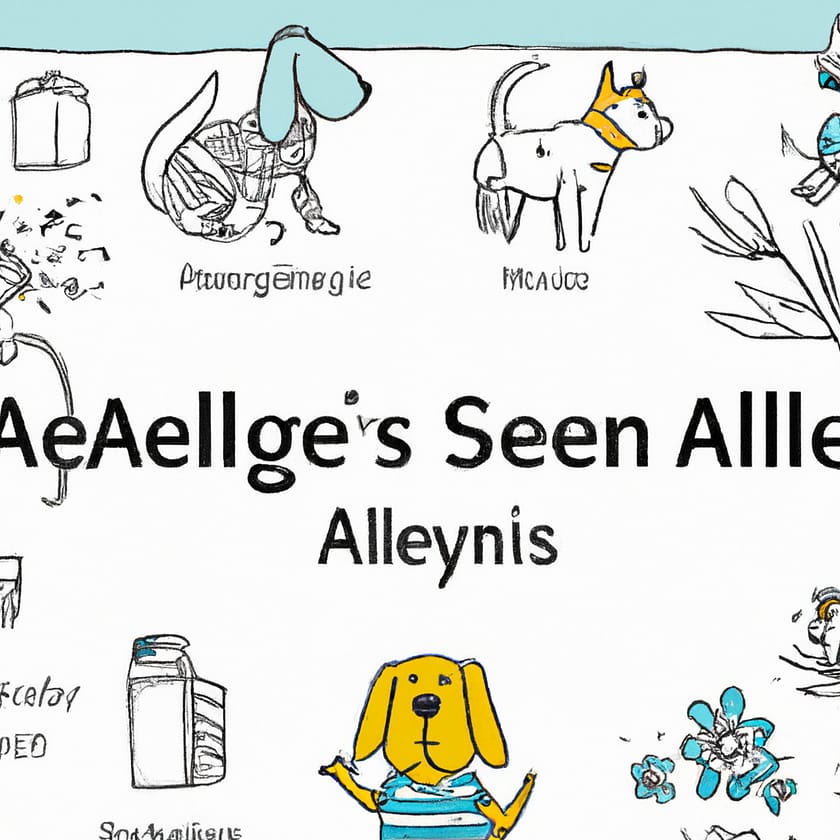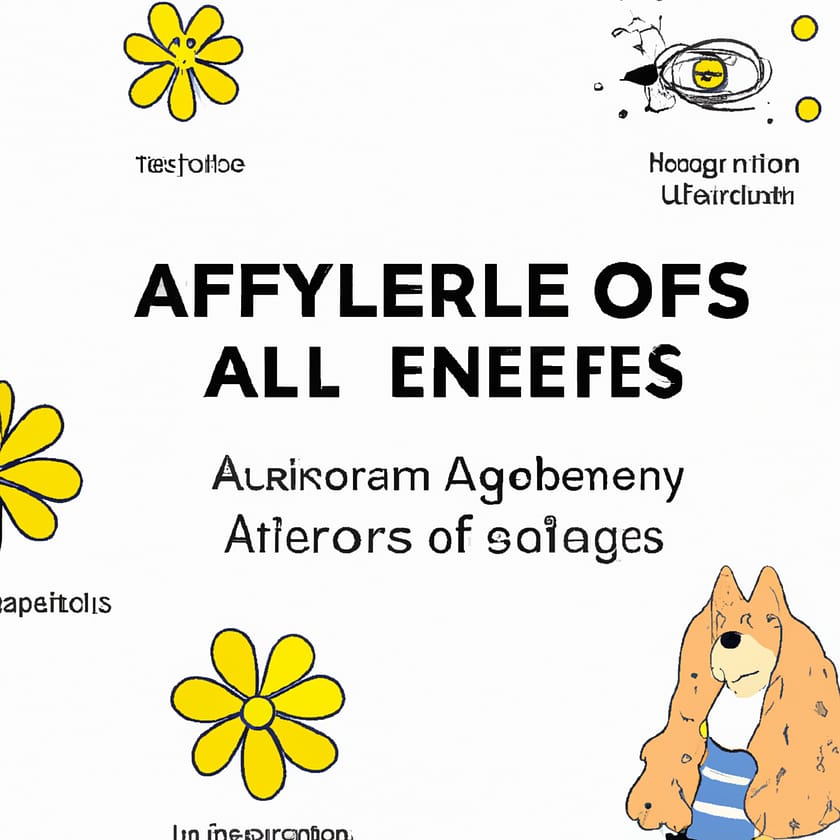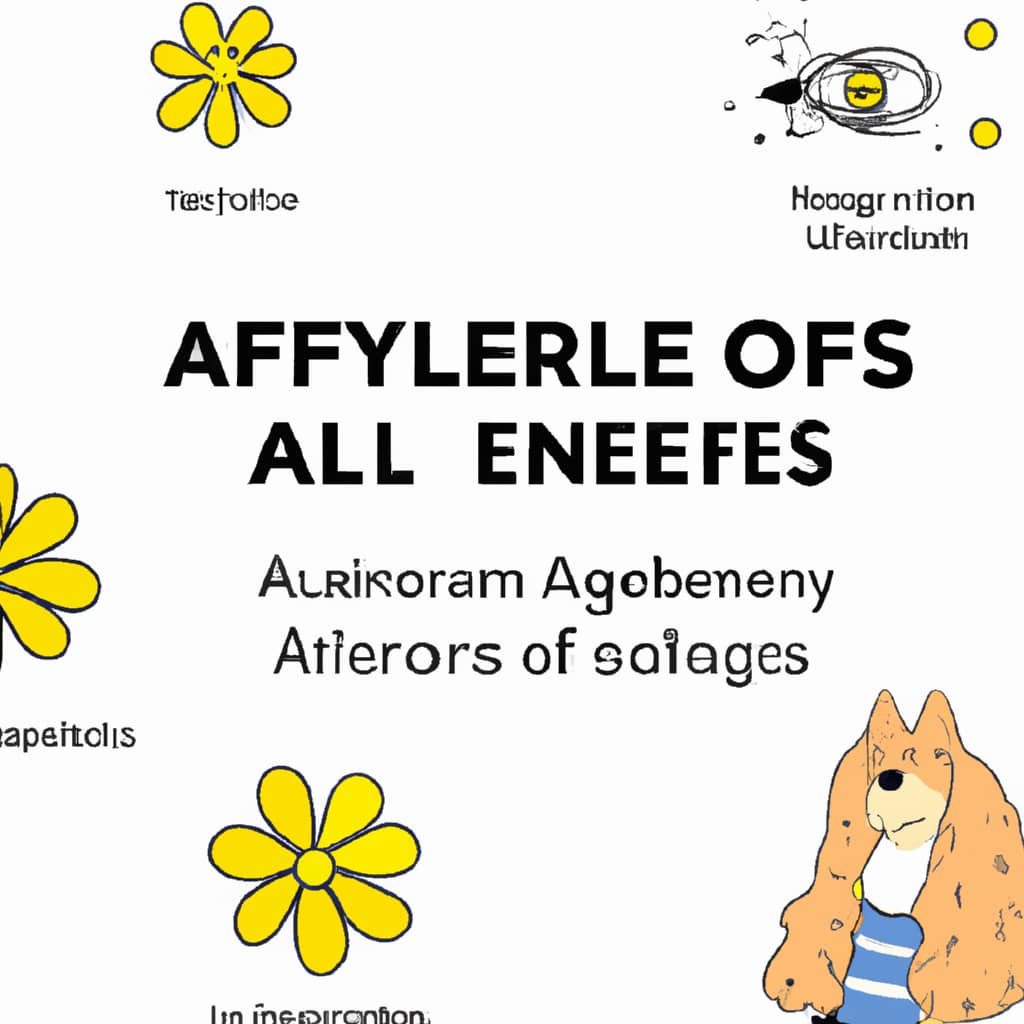Common Allergies In Doodle Breeds And How To Manage Them
In this article, we will explore the common allergies that can affect doodle breeds and discuss effective methods to manage them. Dog allergies can cause discomfort and distress to both pets and their owners, but with the right knowledge and management techniques, it is possible to provide relief and improve their quality of life. From understanding the allergic triggers to implementing specialized care, this guide will equip you with the tools to support your beloved doodle through their allergy journey. So, let’s dive in and discover how to navigate the world of common allergies in doodle breeds.
1. Food Allergies
What are food allergies?
Food allergies refer to an adverse reaction that occurs when a dog’s immune system overreacts to certain food ingredients. In doodle breeds, common food allergies include allergies to specific proteins such as beef, chicken, or dairy products. Other common allergens include grains like wheat, corn, and soy. Food allergies can manifest in various ways, including skin problems, gastrointestinal issues, and even respiratory difficulties in severe cases.
Common food allergies in doodle breeds
Doodle breeds, like Labradoodles and Goldendoodles, are prone to food allergies just like any other dog breed. Due to their highly sensitive nature, doodles may develop allergies to specific types of proteins or grains commonly found in commercial dog food. Some doodles may be allergic to chicken, while others may have adverse reactions to beef or dairy products. Allergies to grains like wheat, corn, and soy are also prevalent in these breeds. It is crucial to identify the specific allergens causing the reactions in order to effectively manage and alleviate the symptoms.
How to manage food allergies in doodle breeds
Managing food allergies in doodle breeds involves a comprehensive approach that includes eliminating the allergen from their diet and providing alternative options. First and foremost, it is essential to consult with a veterinarian to confirm the food allergies and determine the specific ingredients causing the adverse reactions. Once the allergens are identified, you can transition your doodle to a hypoallergenic or limited ingredient diet that avoids the problematic proteins or grains. Additionally, introducing novel protein sources and rotating your dog’s diet can help reduce the risk of developing allergies to new ingredients. Regular monitoring of your doodle’s diet and maintaining open communication with your veterinarian are crucial for successfully managing food allergies in doodle breeds.
2. Environmental Allergies
What are environmental allergies?
Environmental allergies, also known as atopy or atopic dermatitis, are allergic reactions that occur when a dog’s immune system reacts to various environmental elements such as pollen, dust mites, mold, or smoke. Doodle breeds are susceptible to environmental allergies due to their genetic makeup and sensitive skin. These allergies often manifest as itching, redness, rashes, and excessive licking or scratching.
Common environmental allergies in doodle breeds
Doodle breeds commonly develop allergies to pollen, especially during certain seasons when pollen levels are high. Furthermore, dust mites, which thrive in household environments, can trigger allergic reactions in doodles. Mold spores present in damp or poorly ventilated areas can also cause allergies in these breeds. Additionally, some doodles may be sensitive to smoke or airborne pollutants, leading to respiratory discomfort and other allergic responses.
How to manage environmental allergies in doodle breeds
Managing environmental allergies in doodle breeds can be challenging, but there are several strategies to alleviate symptoms and enhance their quality of life. Firstly, it is crucial to minimize exposure to allergens. Regularly cleaning and vacuuming your home can reduce dust mites and mold spores. Keeping windows closed during high pollen seasons and using air purifiers can help limit exposure to pollen and other airborne allergens. If your doodle is sensitive to smoke or chemical irritants, creating a smoke-free environment and avoiding harsh cleaning products or fragrances is essential. Additionally, regular bathing with hypoallergenic shampoos and using prescribed topical medications can provide relief from skin irritation caused by environmental allergies. Consulting with a veterinarian who specializes in dermatology is highly recommended to develop an individualized treatment plan for your doodle’s specific needs.

3. Flea Allergies
What are flea allergies?
Flea allergies, also known as flea allergy dermatitis, occur when dogs have an allergic reaction to the saliva of fleas. Doodle breeds are not exempt from this common allergy. Even a single flea bite can cause severe itching and discomfort in dogs with flea allergies. It is important to note that these allergies are not caused by the flea itself, but rather the proteins present in their saliva.
Common flea allergies in doodle breeds
Doodle breeds, like many other dog breeds, can develop allergies to flea saliva. These allergies can manifest in intense itching, redness, and inflammation of the skin. Some doodles may also experience hair loss or develop hot spots due to excessive scratching and biting in response to flea bites.
How to manage flea allergies in doodle breeds
Preventing and managing flea allergies in doodle breeds requires a multi-faceted approach. The first step is to implement a rigorous flea control regimen to prevent your dog from being bitten. This includes using flea preventive products recommended by your veterinarian and regularly treating your doodle’s environment for fleas. Additionally, grooming your dog regularly with a flea comb can help remove any fleas or flea dirt from their coat. It is also crucial to keep your doodle’s bedding and living areas clean to minimize the risk of flea infestations. In cases where fleas have already caused an allergic reaction, your veterinarian may prescribe medications or topical treatments to alleviate itching and manage any secondary skin infections. Continuous monitoring and proactive flea prevention are key to managing flea allergies in doodle breeds.
4. Contact Allergies
What are contact allergies?
Contact allergies, also known as contact dermatitis, occur when a dog’s skin comes into direct contact with an allergen, resulting in an allergic reaction. Doodle breeds, with their sensitive skin, can be more prone to contact allergies. Common allergens include certain plants, certain types of grass, pesticides, cleaning products, and even certain materials used in bedding or collars.
Common contact allergies in doodle breeds
Doodle breeds can develop contact allergies to various substances they come into contact with. Certain plants or flowers, such as poison ivy or certain types of grass, can cause allergic reactions in doodles. Additionally, exposure to pesticides or certain cleaning products can trigger contact allergies. It is worth noting that some doodles may also be sensitive to specific materials used in bedding or collars, leading to contact allergies.
How to manage contact allergies in doodle breeds
Managing contact allergies in doodle breeds begins with identifying and eliminating the allergen from their environment. If you suspect your doodle has a contact allergy, it is vital to identify the specific allergen causing the reaction. Avoiding contact with the allergen is the most effective approach. This may include minimizing exposure to certain plants, switching to natural or hypoallergenic cleaning products, or using alternative materials for bedding and collars. Regular bathing with a gentle shampoo can help remove any traces of the allergen from your dog’s skin. In some cases, your veterinarian may prescribe topical or oral medications to alleviate itching and reduce inflammation. Close communication with your veterinarian and ongoing monitoring of your doodle’s environment can help manage contact allergies effectively.

5. Pollen Allergies
What are pollen allergies?
Pollen allergies, also known as hay fever or seasonal allergies, occur when a dog’s immune system reacts to pollen from various plants and trees. Doodle breeds are susceptible to pollen allergies, just like humans. Pollen is most prevalent during spring and fall when plants release their pollen into the air for pollination.
Common pollen allergies in doodle breeds
Doodle breeds commonly develop allergies to pollen from different plants and trees. Grass pollen, tree pollen, and weed pollen are major culprits that can cause allergic reactions in doodles. Symptoms may range from mild itching and sneezing to more severe respiratory distress and skin irritation.
How to manage pollen allergies in doodle breeds
Managing pollen allergies in doodle breeds involves minimizing exposure to pollen as much as possible. During high pollen seasons, it is recommended to limit your doodle’s outdoor activities, especially during peak pollen times, such as early morning or late afternoon when pollen counts are higher. Wiping your doodle’s paws and coat after being outside can help remove any pollen particles. Additionally, keeping windows closed and using air purifiers at home can help reduce indoor pollen levels. Regular bathing with hypoallergenic shampoos can also provide relief by removing pollen from your doodle’s coat. If symptoms persist, your veterinarian may recommend antihistamines or other allergy medications to alleviate your doodle’s discomfort during pollen seasons.
6. Dust Mite Allergies
What are dust mite allergies?
Dust mite allergies occur when dogs develop an immune response to the microscopic bugs called dust mites that are commonly found in household dust. Doodle breeds, with their sensitive skin, can develop allergies to dust mites, leading to skin irritation and other allergic reactions.
Common dust mite allergies in doodle breeds
Doodle breeds commonly develop allergies to dust mites due to their sensitivity. Dust mites are commonly found in bedding, carpets, upholstery, and other areas where dust accumulates in the home. Exposure to these microscopic bugs can cause itching, redness, and skin irritation in doodles.
How to manage dust mite allergies in doodle breeds
Managing dust mite allergies in doodle breeds involves minimizing exposure to dust mites and their allergens. Regularly washing your doodle’s bedding, vacuuming carpets and upholstery, and using dust mite-proof covers on your dog’s bedding can significantly reduce allergen levels. Keeping the indoor humidity low can also discourage dust mite growth. Additionally, using air purifiers with HEPA filters can help remove the allergens from the air. Regular grooming and bathing your doodle with hypoallergenic shampoos can help alleviate skin irritation caused by dust mite allergies. If necessary, your veterinarian may prescribe antihistamines or other medications to manage the symptoms more effectively.
7. Mold Allergies
What are mold allergies?
Mold allergies occur when dogs develop an immune response to mold spores that are present in damp or poorly ventilated areas. Doodle breeds may be more prone to mold allergies due to their sensitive nature and skin.
Common mold allergies in doodle breeds
Doodle breeds can develop mold allergies when they come into contact with mold spores. Mold thrives in areas with high humidity, such as bathrooms, basements, or areas affected by water damage. Symptoms of mold allergies in doodles may include itching, redness, sneezing, and respiratory problems.
How to manage mold allergies in doodle breeds
Managing mold allergies in doodle breeds involves reducing exposure to mold spores as much as possible. This includes keeping indoor humidity levels low, ensuring proper ventilation in damp areas, and promptly addressing any water leaks or damage. Regularly cleaning and disinfecting areas prone to mold growth, such as bathrooms, is also essential. Bathing your doodle with hypoallergenic shampoos can help remove any mold spores that may be present on their coat. If your doodle’s allergies persist or worsen, it is advisable to consult with a veterinarian for further evaluation and potential treatment options.
8. Smoke Allergies
What are smoke allergies?
Smoke allergies occur when dogs have an adverse reaction to smoke or airborne pollutants. Doodle breeds, known for their sensitive respiratory systems, can develop allergies to smoke, causing respiratory distress and other symptoms.
Common smoke allergies in doodle breeds
Doodle breeds may develop allergies to smoke or airborne pollutants present in the environment. Cigarette smoke, fireplace smoke, or even smoke from outdoor grills can trigger allergic reactions in these breeds. Symptoms may include coughing, wheezing, sneezing, and difficulty breathing.
How to manage smoke allergies in doodle breeds
Managing smoke allergies in doodle breeds involves minimizing exposure to smoke and improving indoor air quality. Creating a smoke-free environment for your doodle is essential. If you smoke, it is highly recommended to do so outdoors or in well-ventilated areas away from your doodle. Regularly cleaning and dusting your home, using air purifiers with HEPA filters, and maintaining proper ventilation can also help reduce smoke and pollutants indoors. If your doodle’s symptoms persist or worsen, consult with a veterinarian for further guidance and potential medications to alleviate respiratory distress.
9. Shampoo Allergies
What are shampoo allergies?
Shampoo allergies occur when dogs have an allergic reaction to the ingredients present in certain shampoos or grooming products. Doodle breeds, known for their sensitive skin, can be more prone to shampoo allergies.
Common shampoo allergies in doodle breeds
Doodle breeds can develop allergies to specific ingredients commonly found in shampoos or grooming products. These ingredients may include fragrances, dyes, preservatives, or certain chemicals. Allergic reactions to shampoos can lead to skin irritation, itchiness, and redness.
How to manage shampoo allergies in doodle breeds
Managing shampoo allergies in doodle breeds involves using hypoallergenic or fragrance-free shampoos and grooming products. Avoiding shampoos with harsh chemicals, artificial fragrances, and dyes can significantly reduce the risk of allergic reactions. When bathing your doodle, thoroughly rinse off all shampoo residue to minimize the chance of skin irritation. Patch testing a small area of your doodle’s skin with a new shampoo before full-body use is also recommended to ensure no adverse reactions occur. If sensitivity to shampoos persists, consult with your veterinarian for alternative grooming products or potential medications to alleviate any discomfort.
10. Medication Allergies
What are medication allergies?
Medication allergies occur when dogs have an allergic reaction to certain medications or treatments. Doodle breeds, with their sensitive nature, can be more prone to medication allergies compared to other breeds.
Common medication allergies in doodle breeds
Doodle breeds can develop allergies to various medications, including antibiotics, non-steroidal anti-inflammatory drugs (NSAIDs), or even topical treatments. Allergic reactions can manifest as itching, hives, swelling, or even more severe symptoms such as difficulty breathing.
How to manage medication allergies in doodle breeds
Managing medication allergies in doodle breeds requires close monitoring and communication with your veterinarian. It is vital to inform your veterinarian about any known allergies or adverse reactions your doodle may have had to specific medications in the past. Your veterinarian will choose alternative medications or treatments based on your doodle’s specific needs and medical history. It is essential to closely follow your veterinarian’s instructions when administering medications and to monitor your doodle for any signs of allergic reactions. If your doodle exhibits any concerning symptoms, contact your veterinarian immediately for further guidance and potential treatment adjustments.
In conclusion, doodle breeds can be prone to various allergies, including food allergies, environmental allergies, flea allergies, contact allergies, pollen allergies, dust mite allergies, mold allergies, smoke allergies, shampoo allergies, and medication allergies. Identifying the specific allergens causing the reactions and implementing appropriate management strategies is crucial for improving the quality of life for doodles with allergies. Remember to consult with a veterinarian specializing in allergies to obtain an accurate diagnosis and develop an individualized treatment plan for your doodle’s specific needs. With proper management, you can help your beloved doodle live a happy, healthy, and allergy-free life.













